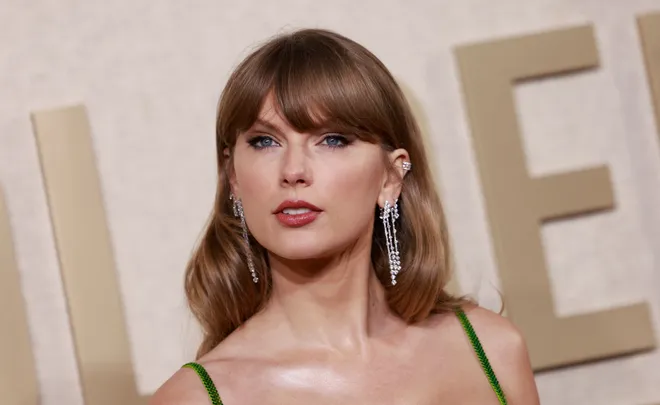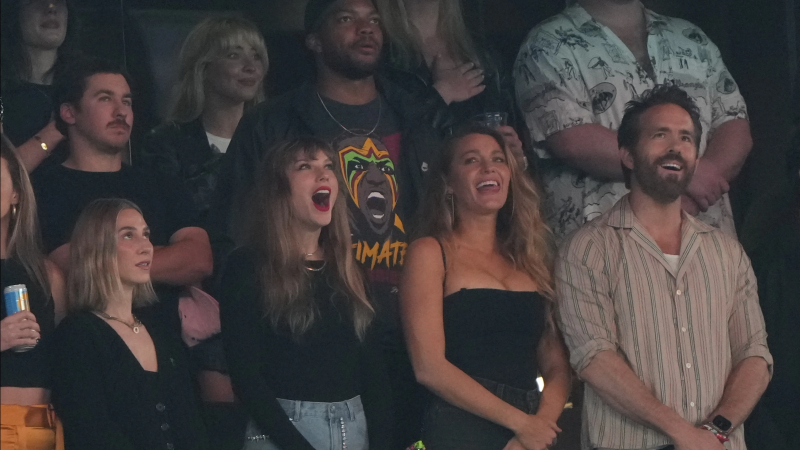Taylor Swift is a cultural phenomenon. She's also a victim of AI deepfakes.
Last year was spectacular for the 34-year-old Taylor Swift, the sequined superstar whose Eras concert tour spanned five continents and became not only critically acclaimed but the highest grossing tour of all time, surpassing $1 billon.
Billboard magazine described it as “the must-see blockbuster of the year,” a music and fashion showcase.
Taylor was everywhere, a cultural phenomenon, an Elvis-like presence with millions of followers – 283 million on Instagram and on X, formally Twitter, more than 95 million banded together as “Swifties.” For young women she was more than a performer; she was a warrior of independence and heartbreak.
Time magazine named her Person of the Year, the first selected because of arts achievement, the first woman recognized more than once.
And then 2024 dawned. When she started attending her boyfriend’s football games, the cameras loved her presence but some fans complained bitterly about her hogging the screen. Around the same time, conservative media began to float preposterous conspiracy theories that the U.S. government was using her to block the path of Donald Trump's presidential reelection campaign.

But late January brought a crash to the soaring Swift moment: Dozens of artificial intelligence-generated deepfake pornographic images of the demure Swift appeared on various sites, especially X. She was explicitly nude, incredibly realistic and seen on 45 million views, with 24,000 reposts before the images were removed after 17 hours.
AI, now almost as pervasive as Swift herself, had struck its most high-profile target ever.
'Damage done to women is paramount'
Allie McKenna, a personal stylist from Brooklyn, New York, has been a “Swifty” for 17 years. Most recently she saw Swift in concert in Los Angeles. But she’s more than just a pop icon to McKenna.
Swift's song “White Horse” helped McKenna “heal from an abusive relationship and ‘Fearless’ helped me start and end my marriage,” she told me.
McKenna has the word "Fearless" tattooed on her left shoulder. The deepfake sexualized images were a personal affront to McKenna – and millions of women.
“The damage to women is paramount, the damage to anyone who is affected by AI-generated images is paramount,” McKenna said. “If Taylor Swift’s AI-generated photos are any indication of how this can quickly get out of control, the damage is unimaginable.”

What about Kate Middleton's photo?
And it is now bordering on out of control – and just beginning. Reports regularly surface of high school girls being deepfaked with AI technology. In 2023 AI-generated porn ballooned across the internet with more than 143,000 deepfake videos getting 4.2 billion views, according to The Washington Post. Most of the videos were nonconsensual.
Even the British royalty has gotten stuck in a deepfake mess, with AI-altered images of Princess Kate – who admitted editing them herself – had to be pulled from wire services and news websites this week in an embarrassing snafu.
Will we finally care?Taylor Swift AI pictures highlight the horrors of deepfake porn
Should deepfakes be criminal?
“Try to imagine the horror of receiving intimate images looking exactly like you – or your daughter, or your wife or your sister – and you can’t prove it’s not,” said Rep. Joseph Morelle, D-N.Y., who has introduced federal legislation. “Deepfake pornography is sexual exploitation, it’s abusive, and I’m astounded it is not already a federal crime.”
But it is not.
AI is a monstrous, overwhelming technology on steroids. However, AI can also often perform tasks better than humans. It can realistically mimic photos, audio and video with potential to change how we live, work and play.
The internet and social media possibilities are endless – for good and bad. The question: Can the publication of these images be controlled? Can the beast be tamed? After all, this new form of speech is protected by the First Amendment. And we have no state or federal laws to at least give us a chance to prevent these terribly harmful images from being published.
I come back to James Madison, the main architect of the 45 words of the First Amendment free speech clause. If someone told him in the 1790s, "We can depict in incredibly realistic terms naked pictures of your wife, Dolley, would you protect them? What do you think, Jimmy? An exception?"
Right now, they’re protected. Obscenity is not protected speech, but pornography of this sort is not considered obscene. So women’s options are limited. Swift could bring a civil lawsuit for “false light invasion of privacy.” You cannot falsely portray someone in a damaging manner, a civil but not criminal abuse.
Swift, a billionaire, certainly has the resources to find and punish the perpetrators, but suing the X platform isn’t even possible. The infamous Section 230 of federal law gives iron-clad protection to the social media giants.
And should Swift have to carry the burden of leading the fight against deepfakes? As McKenna pointed out, “While she does have an enormous platform to influence regulations, I don’t think it should be her burden unless she wants to take a political stand.”
Thus far, Swift has encouraged her followers to vote in elections but has not jumped into legislative battles.
Seeing isn't believing:From Gaza to US politics, deepfake videos are peddling fake news
Does freedom of speech penalize women?
How do we fix it? A decade ago, law professor Mary Anne Franks led the fight for laws to prevent “image-based sexual abuse” (which includes sextortion, upskirting, revenge porn, deepfakes, digital sex trafficking, cyberflashing – and now deepfakes).
Franks sees the need for federal and state laws, which won’t be passed quickly; changes to the technology, which AI makers claim is in progress; and a societal response of outrage. But it will take more than the #ProtectTaylorSwift hashtag that has emerged.
Standing in the way might be the First Amendment.
“In the United States, our hyper-fixation on the First Amendment has resulted in overprotection of abusive content,” writes Kristin O’Donoghue in Ms. magazine. “By promoting freedom of speech at all costs, we have democratized violence and penalized women.” And Madison did not have that in mind.
In Europe, laws are emerging to protect individuals over free speech rights. Neither a wide-open marketplace of ideas nor a profit-first marketplace should be driving this debate. The rights of women need to be, as McKenna put it, “paramount.”
We have chased an abusive press many times before and raced to catch up to an unregulated technology. The internet is our toughest challenge yet. But we can do it again. Morelle’s proposed federal law is a starting place. What say you, Joe Biden and Donald Trump?
Rob Miraldi’s First Amendment writing has won numerous awards. He taught journalism at the State University of New York for many years. This column originally appeared on northjersey.com
Disclaimer: The copyright of this article belongs to the original author. Reposting this article is solely for the purpose of information dissemination and does not constitute any investment advice. If there is any infringement, please contact us immediately. We will make corrections or deletions as necessary. Thank you.







